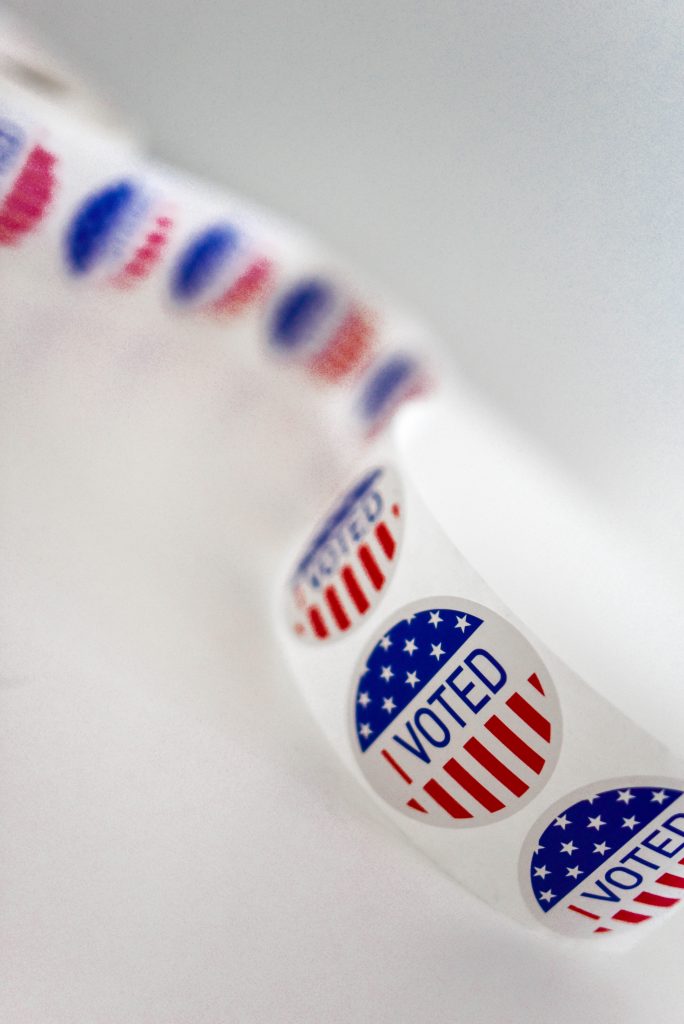English Words in the News: Primary Posted by Gary Locke on Feb 6, 2020 in Culture, News
I live in New Hampshire, which means that every four years, media from all over the world stumble over each other in an effort to learn what my neighbors are thinking about. This is not an exaggeration. I was once interviewed on Danish television!
The reason for this quadrennial (meaning every four years) fascination with my home state is that New Hampshire holds the first presidential primary election. Following the Iowa caucuses, New Hampshire residents vote for the candidate they prefer in the political party of their choice. Sort of.
Parties and Ballots
New Hampshire is one of the rare states which allows registered voters who identify themselves as Independent to vote in a primary election. An Independent voter is not aligned with any particular party. On the day of the primary, a registered Independent voter can walk into a polling station and declare which party’s (Republican or Democrat) ballot they want. This announces that they are, at least temporarily, a member of that party. However, that same voter can re-register as an Independent before they even leave their polling station. I’ve known many people who switch their party status twice in the same year. Registered Democrats and Republicans can only change their party affiliation a few weeks before the election.
Because it is a primary and not a caucus, the vote is secret. Typically on primary day I drive to the polling station, which is a large school auditorium, and wait in line for my chance to vote. Once I’m at the front of the line I tell the poll worker my name and address. I’ll be handed a large sheet of paper, called a ballot, with all the candidates’ names, their hometown, and an oval next to that candidate’s name on the side.
Next, I walk into a partially draped booth with an attached metal table, closing the drape behind me. I will take a felt-tip marker and fill in the oval next to the name of my preferred candidate on the ballot. If I don’t take too long finding the name on the ballot (the order in which they appear is randomly selected), I’m out of the booth in less than 30 seconds. I walk to one of several machines and slide the ballot face-down, into the machine designated for the party that I voted for. That machine reads the black dot that I made next to the candidate’s name and counts my vote. I can be out of the polling station in under a minute, wearing an I Voted sticker as a sign of having done my civic duty.
Here’s a link to a sample of the two New Hampshire ballots for this year’s primary.
I know what you’re thinking. That’s a lot of names! Including, on the Republican ballot, one person with the name President R. Boddie. He’s not expected to win. He’s on the ballot, along with all those other people, because he paid a $1000 fee. That’s it. For a mere $1000, you can get your name on one of the New Hampshire primary ballots.
What it all means
Because it is the first primary, there are more candidates running than there will be a month from now. Candidates who lose badly soon “suspend their candidacy” or, to put it another way, they quit. In fact, some of the names on the ballots already have suspended their campaigns
Unlike a caucus, the primary measures the number of votes each candidate receives directly. This popular vote gives lesser-known candidates a chance to demonstrate their appeal. A candidate who exceeds expectations in New Hampshire will change the dynamics of the election. Jimmy Carter, in 1976, was a newcomer to national politics, but the then-governor of Georgia walked all over New Hampshire, meeting with many people who had never met a presidential candidate before. He won the primary in a surprising upset over better-known politicians and went on to become the 39th president of the United States.
Similarly, candidates who fail to meet expectations may never recover. That same year in which Carter triumphed, Republican President Gerald Ford barely defeated former California Governor Ronald Reagan. The underperforming Ford barely managed to win his party’s nomination in 1976 and was always behind in the general election. Reagan went on to defeat Carter in the presidential election four years later, in 1980.
New Hampshire is just the first
Every state has its own procedures for voting. Remember that paper ballot? Some states don’t use them. Instead, they rely on automated voting machines. This method has come under close scrutiny because of fears that they can be hacked into, changing the results. With paper ballots as a backup, it is possible to recount votes if there is any question as to the validity of the election outcome.
The election process in the United States is lengthy. Primaries will be held across the country through to June 2. Much can, and will, happen between those dates. And many will proudly wear those stickers.

Build vocabulary, practice pronunciation, and more with Transparent Language Online. Available anytime, anywhere, on any device.




